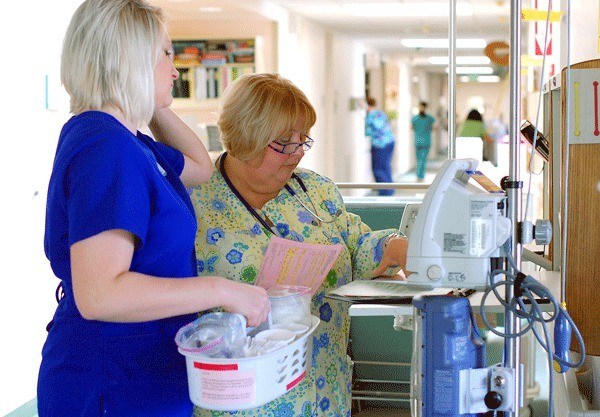After years of delay and indecision, Whidbey General Hospital staff have gotten their first official go ahead to proceed with plans for a $50 million expansion project.
On Monday, the hospital’s Board of Commissioners voted unanimously to allow staff to begin educating the public on the possible project. Although the board still has to approve a formal resolution that includes details such as total cost and when it will go before the public, the hope is to have a bond request on the May 2011 ballot.
Commissioner Roger Case, who wished to make it clear he does not speak for the board, said Monday’s decision only authorized public education. However, he said he would be very surprised if the board did not carry through with its plans.
“In my mind, we have to move ahead,” Case said.
The plan is to build an entirely new wing on the south end of the facility that will replace the oldest part of the hospital, the existing medical surgical wing. It’s suffering from dilapidating infrastructure and is so small that patients are often forced to bunk two to a room. The 40-room addition would be used for medical surgical, critical care and impatient services.
It is still unclear just how much the bond will cost tax payers, but Whidbey General spokesperson Trish Rose said the estimate is between 25 cents and 50 cents per $1,000 of assessed value.
The expansion has been in the works for years, from just talk to the actual hiring of a firm to design the new facility. But the economy and internal discord have constantly derailed the project.
The idea picked up steam again in May when Chief Executive Officer Tom Tomasino called a special meeting of the board and urged the commissioners to commit to the plan so that there would be enough time to educate the public properly.
Several commissioners expressed a variety of concerns. One of the biggest worries was the timing of the project. Commissioner Paul Zaveruha, who is also a surgeon at the hospital, said he was uncomfortable about asking voters to approve a tax-hike during a recession.
The issue would be discussed for two more months – getting the stamp of approval of the hospital’s building committee and the medical executive committee, then getting tabled at the commissioners June meeting – before Monday’s landmark decision to forge ahead.
Zaveruha said this week that he is still concerned about the economy and whether this is the right time to ask the community to pay for a $50 million bond. He voted to proceed because he said the hospital needs this project.
“I’m convinced this has to be done for the future of Whidbey General Hospital,” Zaveruha said.
According to information in a presentation to the board during Monday’s meeting, the economic blow should be lessoned due to several factors. First, the information claims that Whidbey General’s levy is lower than both Island Hospital in Anacortes and Skagit Valley Hospital in Mount Vernon. It also pointed out that the existing rate will decrease further when an existing hospital bond expires.
Neither Chief Financial Officer Joe Vessey, the presenter of most of this information during Monday’s meeting, nor Tomasino could not be reached for comment by press time.
Case said the upcoming educational campaign will be vital, as the current political climate is one of general distrust for government. If the bond is to succeed at the polls, the public will need to understand that the expansion project is not only needed, but that it is affordable.
“People will just need to be comfortable that their dollars are being spent wisely and for the benefit of the community,” he said.



